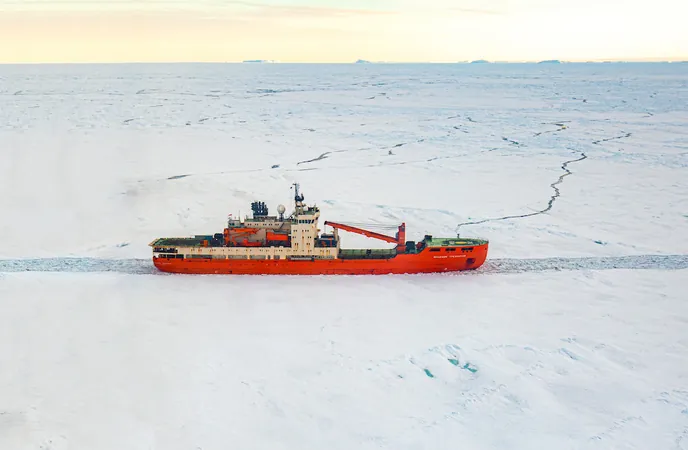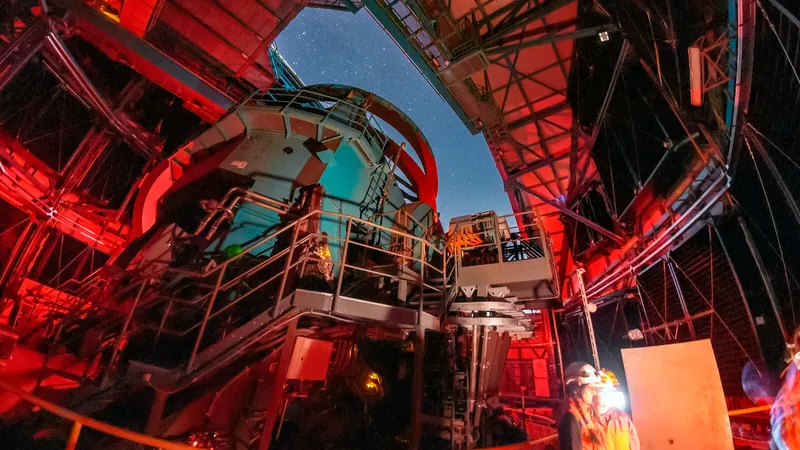
Unveiling Antarctica's Crisis: Microplastics, Melting Ice, and the Global Implications
2025-06-16
Author: Amelia
Alarming Changes in Antarctica
From swiftly melting glaciers to vast fields of expanding moss, recent observations during a groundbreaking expedition reveal the alarming impacts of climate change in Antarctica. A team of 57 researchers embarked on a 70-day journey aboard the Russian icebreaker Akademik Tryoshnikov, collecting vital data that highlights the ongoing crisis. Among their findings was the troubling discovery of microplastics infiltrating this pristine environment and a notable decrease in the Southern Ocean's salinity due to melting ice.
Antarctica: A Crucial Climate Regulator
As Earth's fifth-largest continent, Antarctica plays a pivotal role in regulating our planet's climate. Alongside its Arctic counterpart, it helps redistribute the thermal energy absorbed at the equator. Led by Brazilian glaciologist Jefferson Cardia Simões from the Federal University of Rio Grande do Sul, the International Antarctic Coastal Circumnavigation Expedition (ICCE) explored 29,000 kilometers (about 18,000 miles) of Antarctica's coast in 2024, investigating how climate change is impacting the region's unique microbial life.
Critical Insights from Ice Samples
The research team meticulously drilled into the ice to collect samples that provide invaluable insights into historical atmospheric conditions. "Each layer tells a story of its time, revealing chemicals and snowfall amounts," explained Filipe Lindau, head of the glaciology team. Notably, microplastics were discovered in liquid water samples, raising serious concerns about pollution even in these remote areas.
The Glacier Retreat: A Disturbing Reality
During their journey, the researchers documented significant glacier retreat, with the front of the Lange Glacier receding over 400 meters (a quarter of a mile) from 1995 to 2025 alone, losing a staggering 1.38 kilometers (0.86 miles) from 1956 to 1995. According to studies by the U.S. National Snow and Ice Data Center, abnormal heat influx since 2016 has further decreased sea ice extent by 6,500 square kilometers (about 2,500 square miles), affecting the local ecosystem.
The Ripple Effect on Marine Life
The decline in sea ice threatens krill populations, vital to the Antarctic food chain. Climatologist Venisse Schossler noted that the excessive melting could drastically disrupt the region's delicate balance. Moreover, a connection exists between the Antarctic and the Amazon: cold air masses can bring temperature drops to Brazil while moisture from the rainforests reaches Antarctic shores.
Impacts of Changing Weather Patterns
The expedition also witnessed a cyclone developing in East Antarctica, intricately tied to heat waves in Brazil fueled by warm air from the Amazon. This unusual weather can lead to increased rainfall, posing grave risks for local wildlife. Polar biologist Emanuele Kuhn warned that penguin chicks, adapted to snow, face peril in wet conditions.
The Alarming Global Connection
Deforestation and fires in the Amazon impact Antarctica through smoke that carries black carbon, a potent heat-absorbing pollutant. This haze disrupts the reflectivity of snow and ice, accelerating melting and contributing to global warming. Claudia Parise, part of the expedition, emphasized that atmospheric waves transfer heat and moisture, connecting remote regions in ways previously underestimated.
Phytoplankton at Risk: A Chain Reaction
The influx of glacial meltwater is also decreasing salinity and increasing acidity in the oceans, endangering phytoplankton—often referred to as the lungs of the planet. Simões warned that imbalances in this vital component could have catastrophic effects on the marine food chain and overall climate stability.
The Interconnectedness of Our Planet
Despite concentrated efforts to protect the Amazon, researchers urge for equal focus on Antarctica's crucial role in global climate health. Simões highlighted that the polar oceans act as significant carbon sinks, and losing them could mean an alarming 40% rise in atmospheric CO2 levels. Lindau echoed this sentiment: "Antarctica may seem remote, but its dynamics continuously affect global climate regulation."
A Call to Action
As the crisis unfolds in Antarctica, it is imperative we recognize its interconnectedness with other global ecosystems, including the Amazon. Immediate action is required to address these environmental challenges before it’s too late.









 Brasil (PT)
Brasil (PT)
 Canada (EN)
Canada (EN)
 Chile (ES)
Chile (ES)
 Česko (CS)
Česko (CS)
 대한민국 (KO)
대한민국 (KO)
 España (ES)
España (ES)
 France (FR)
France (FR)
 Hong Kong (EN)
Hong Kong (EN)
 Italia (IT)
Italia (IT)
 日本 (JA)
日本 (JA)
 Magyarország (HU)
Magyarország (HU)
 Norge (NO)
Norge (NO)
 Polska (PL)
Polska (PL)
 Schweiz (DE)
Schweiz (DE)
 Singapore (EN)
Singapore (EN)
 Sverige (SV)
Sverige (SV)
 Suomi (FI)
Suomi (FI)
 Türkiye (TR)
Türkiye (TR)
 الإمارات العربية المتحدة (AR)
الإمارات العربية المتحدة (AR)